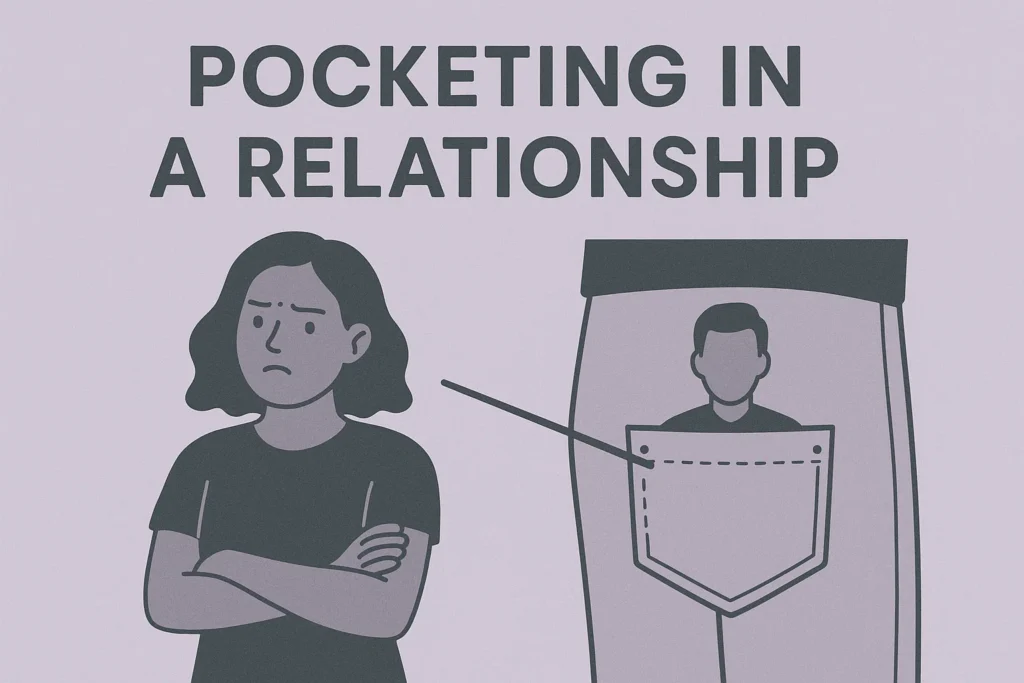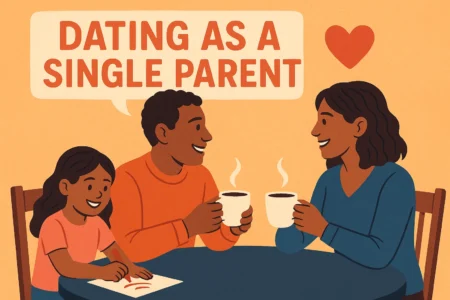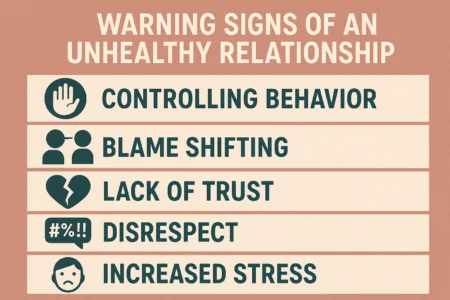You’re dating someone. It’s going well. Great, even. The chemistry is electric, the conversations flow, and you find yourself thinking this could really be something.
There’s just one… weird… thing.
When it comes to their “real life”—their friends, their family, their social media—you are completely, totally, MIA. You’re in their life, but you’re not in their life. It’s a confusing, isolating feeling, and it has a name: pocketing. So, what is pocketing in a relationship? In short, it’s when your partner intentionally keeps you a secret, neatly tucked away from everyone else they know.
You feel like their dirty little secret.
This isn’t just about being a “private person.” This is a pattern of active omission and, in some cases, outright deception. It can leave you questioning your worth, the relationship, and even your own sanity. But you are not crazy for noticing. It’s a real and painful experience.
Let’s pull this confusing behavior out into the light and figure out exactly what it is, why it happens, and what you can do about it.
Key Takeaways
- It’s Not Privacy, It’s Secrecy: Pocketing is the deliberate, one-sided act of hiding your relationship and your existence from their social and family circles.
- Why They Do It: The Reasons Aren’t All Evil (But Some Are). Motives range from understandable (like messy family drama) to massive red flags (like they’re already with someone else).
- Privacy is Shared, Pocketing is One-Sided: A private couple decides together what to share. A pocketer makes a solo decision to hide you.
- The Cost is Your Self-Esteem: Being pocketed is a slow-motion attack on your self-worth, making you feel invisible, anxious, and unworthy.
- How They React to ‘The Talk’ Tells You Everything. Their response to a calm, direct conversation about their behavior will reveal their true intentions and the relationship’s future.
So, What Does “Pocketing” Actually Look Like in Real Life?
Pocketing isn’t always as dramatic as being shoved into a closet when a friend drops by.
Often, it’s a slow burn of subtle exclusions and flimsy excuses. It’s a pattern that leaves you feeling like you only exist in a vacuum, a little bubble that only includes you and your partner.
Some classic signs?
- You’ve been dating for months, but you haven’t met a single one of their friends. Not one.
- When they get a call from a friend or family member, they leave the room to take it.
- Plans are always at your place. Always. Theirs is apparently off-limits, a fortress of solitude you’re not invited to.
- If you do run into someone they know, the introduction is painfully awkward. You’re introduced as a “friend,” a “colleague,” or, worst of all, not introduced at all.
- Their social media is a ghost town when it comes to you. They post pictures of their brunch, their cat, their friends… but there’s not a single trace of your existence.
I remember this feeling all too well. I dated a guy, let’s call him “Alex,” for a solid four months. We spent all our free time together. I thought we were serious. But I was basically a vampire; I only existed in the dark.
He’d get texts from friends making plans, and he’d reply, “Nah, I’m busy tonight,” instead of, “Cool, can I bring my girlfriend, [my name]?” He had a million excuses. “Oh, my friends are just… a lot. You wouldn’t like them.” Or, “My sister is going through a tough time, it’s just not a good time.”
It was subtle, but the message was clear: I was welcome in his bed, but not in his life.
Why Would Someone Even Do This? Is It Always Malicious?
This is the question that keeps you up at night, isn’t it?
You rack your brain trying to figure it out. “They seem to like me… so why?” The truth is, the reasons for pocketing are a mixed bag, ranging from “okay, I can kinda see that” to “run for the hills right now.”
It’s almost never about you and almost always about them.
It’s crucial to understand that not every pocketer is a villain in a trench coat, living a double life.
But… some are.
The motivation behind the secrecy is what separates a temporary misunderstanding from a fundamental, relationship-ending red flag.
Could There Be… Innocent Reasons?
Let’s start with the best-case scenarios. Sometimes, the pocketing isn’t meant to be malicious, even if it feels awful. Your partner might be acting out of a place of fear, anxiety, or just plain old poor timing.
- They’re Genuinely Slow Movers: Some people are just incredibly slow to integrate a new partner into their lives. They see introductions as a massive step, one they don’t take until they are 110% sure. Their pace is just different from yours.
- Messy Family Dynamics: Oh, this one’s a classic. I once had a friend who was “pocketed” only to find out her boyfriend’s family was intensely critical and had ruined his last two relationships. He was, in his own clumsy way, trying to protect her from them until he was sure the relationship was strong enough to withstand the “dragon’s den.”
- A Recent, Nasty Breakup: If they just got out of a long-term relationship, they might be shielding you (and themselves) from the inevitable drama. Their friends might all be “his-and-hers” friends, and they’re just trying to figure out the new social landscape.
- They’re Genuinely Embarrassed… of Their Life: This one’s tricky. Maybe they have a messy roommate situation, or their family life is chaotic. They’re not ashamed of you; they’re ashamed of their circumstances and don’t want you to see them in that light.
In these cases, the behavior is still hurtful, but the intent isn’t to devalue you. It’s usually a temporary problem that can be solved with communication.
And What About the… Not-So-Innocent Reasons?
And now, for the other side of the coin. This is the stuff that should make your internal alarms go off. Often, pocketing is a bright red flag, waving furiously in your face, telling you something is deeply wrong.
The most common and painful reasons?
They are already in a relationship.
They’re cheating.
You are, quite literally, the “other person.” They hide you because their actual partner, their friends, and their family already know them as part of a couple.
They don’t see a future with you. This one stings. You are their “for now” person, not their “forever” person. You’re fun, you’re convenient, but in their mind, the relationship has an expiration date. Why bother with introductions when you’re not going to be around long-term?
They are embarrassed by you. This is appallingly cruel, but it happens. You might not fit the “image” they want to project, whether it’s because of your job, your background, or some other shallow reason.
They are living a double life. This goes beyond simple cheating. They might be lying about their job, their age, their entire identity. Keeping you separate from everyone they know is essential to maintaining their web of lies.
How Being “Pocketed” Wrecks Your Head (And Your Heart)
Being pocketed is a uniquely corrosive experience. It’s a form of emotional death by a thousand cuts. It chips away at your self-worth, bit by bit, until you’re left feeling like a shell of yourself.
It makes you question everything.
“Am I not pretty enough?” “Am I too loud?” “Am I boring?” “What is wrong with me that they don’t want to show me off?”
You start to internalize their secrecy, believing you must be the problem.
It’s isolating. You’re in a relationship, but you feel profoundly alone. You can’t share the person you’re excited about with your own friends, because the inevitable question, “So, when do we get to meet them?” is too painful to answer. “He’s busy,” you say, for the twentieth time.
I dated a guy once who was a prolific social media user. He posted stories of his friends, his dog, his weekend trips, his lunch. But I was a ghost. I’d be sitting right across the table from him, and he’d take a picture of his beer, carefully angling me out of the shot.
The feeling of invisibility was crushing. It was a clear, public declaration that I was not part of the life he was proud to project.
It made me feel small. It made me feel cheap.
And that’s the real danger. The longer it goes on, the more you start to believe it. You start to believe you are someone who should be hidden.
The Social Media Black Hole: The New Frontier of Pocketing?
In today’s world, pocketing has a whole new, very public dimension: social media. It’s one thing to not be invited to a friend’s barbecue. It’s another to see digital proof that you don’t exist.
This is where the line between “privacy” and “secrecy” gets blurry for some people, so let’s make it crystal clear.
Privacy is a couple deciding together not to post every intimate detail of their life. It’s a mutual agreement.
Secrecy is one person actively hiding the other. It’s a unilateral decision that creates an imbalance of power.
The social media pocketer is a special breed. They might:
- Refuse to accept your follow request (a massive red flag).
- Untag themselves from any photo you post of them.
- Post group photos from an event you both attended, but only use the ones you’re not in.
- Keep their “relationship status” on Facebook conspicuously set to “Single.”
It’s a digital erasure. They are curating an image, and for whatever reason, you are not part of it. This isn’t just about “not being on Instagram.” It’s about a person who is on Instagram actively and deliberately curating you out of their narrative.
Is My Partner Pocketing Me, or Are They Just Private?
This is the million-dollar question. It’s the one that lets you talk yourself out of what your gut is screaming at you. “Maybe he’s just a private person!”
Here’s how you tell the difference.
A truly private person is consistent. They don’t post much about anyone. Their social media is sparse. They don’t talk about their friends or family in detail. Their whole life is low-key.
A pocketer is selectively secret. They are an open book about every other part of their life. You see pictures of them with their friends. They tell you stories about their family. Their life is public, except for you. You are the single, glaring omission.
A private person will also be able to communicate this. A healthy, private partner will say something like, “Hey, I just want you to know I’m a really private person and I don’t post about my relationships online. But I’m all in on us, and it has nothing to do with how I feel about you.”
A pocketer will deflect, make excuses, and get defensive.
Look, healthy relationships are about trust. That’s it. That’s the whole game. As experts from Utah State University explain in their research on building healthy relationships, trust is the cornerstone.
Pocketing isn’t a “boundary.” It’s a barrier. It’s a direct hit on that trust.
What Happens if Pocketing Goes On for Too Long?
Like any secret, pocketing can’t last forever. It creates a toxic environment where resentment builds. The longer you are “pocketed,” the more it damages the foundation of the relationship—and you.
It creates a profound power imbalance. Your partner holds all the cards. They control when, where, and if you are seen. You are left in a constant state of waiting, hoping to be “promoted” from secret to girlfriend. This is not a healthy dynamic.
It prevents the relationship from ever growing. A relationship moves forward through integration. You meet the friends, you survive the weird family Thanksgiving, you build a shared life. By keeping you separate, your partner has effectively put a cap on the relationship. It cannot and will not evolve.
Eventually, the trust doesn’t just crack; it shatters. You become suspicious. You check their phone. You become the “crazy, paranoid” person they will eventually accuse you of being, all because their secrecy created that environment. It’s a self-fulfilling prophecy.
Okay, I’m 99% Sure I’m Being Pocketed. What Do I Do NOW?
First, take a deep breath. You are not powerless here. You have every right to be in a relationship where you are seen, valued, and celebrated.
The first step is to get clarity. And that requires the one thing the pocketer has been avoiding: a direct, honest conversation.
Step 1: Check in with yourself. Before you say a word to them, get clear on how you feel. Not what you think you should feel, but what you actually feel. Are you hurt? Confused? Angry? All of the above? Good. Your feelings are valid. What do you want? To meet their friends? To be acknowledged? Is this a dealbreaker?
Step 2: Plan the conversation. Do not do this in the middle of a fight. Do not do it over text. Wait for a calm, neutral moment when you are both sober and have time to talk without being interrupted.
Step 3: Use “I” statements. This is the part everyone says, and it sounds like cheesy therapist-talk, but it’s critical. You must use “I” statements. This isn’t an attack; it’s a report on how you are feeling.
- Instead of: “You never introduce me to anyone!”
- Try: “I’ve been feeling hurt and confused that I haven’t met anyone from your life.”
- Instead of: “Why are you hiding me?”
- Try: “I’m starting to feel like a secret, and it’s making me feel insecure about us.”
- Then, state your need clearly: “It would mean a lot to me if we could grab a casual drink with your friends sometime next week.”
What Should I Listen for in Their Answer?
Their reaction is everything. It’s more important than their words.
Potential Green Flags: They are receptive, even if they’re surprised. They look you in the eye. They apologize for making you feel this way. They validate your feelings (“I’m so sorry, I didn’t realize I was doing that. You’re right.”). And, most importantly, they offer a specific reason and a specific, actionable solution.
- Good Answer: “You’re totally right. I’ve been dragging my feet because my sister is so judgmental, and I was nervous. But that’s not fair to you. How about we all get dinner this Friday? I’d love for you to meet her.”
Massive Red Flags: They get angry. They get defensive. They gaslight you.
- Bad Answer: “Why are you always starting fights? You’re being so needy.”
- Bad Answer: “You’re paranoid. I’m not hiding you.” (This is gaslighting—they’re denying your reality.)
- Bad Answer: “Soon, okay? Just… when the time is right.” (This is a vague, non-answer designed to shut you up.)
What if They Get Defensive?
This, right here, is your answer.
I finally brought this up with “Alex,” the guy I mentioned earlier. I calmly said, “I’m starting to feel like I’m being hidden from your life, and it’s really starting to hurt.”
He exploded. Not in anger, but in a flurry of defensiveness. “Why are you putting this pressure on me? I’m just not ready! My life is so complicated! You’re making this a big deal!”
He didn’t hear a word I said. He didn’t validate my feelings. He made it all about him and his “pressure.” I realized in that moment that his reasons didn’t matter. His reaction told me everything. He was not willing to see my side, he was not willing to compromise, and he was perfectly happy to keep me in my little box as long as it was convenient for him.
His defensiveness was a wall. And it was the end of the line for me.
Can a Relationship Even Survive After Pocketing?
I’m a romantic. I want to say yes, of course! But the truth is… it’s tough.
A relationship can only survive pocketing if the pocketer has a genuine “come to Jesus” moment. They have to:
- Acknowledge their behavior was hurtful.
- Give a valid, understandable (and likely temporary) reason.
- Actively and immediately change their behavior.
This isn’t just one introduction. This is a complete 180. This means they start making an effort to un-pocket you.
- They set a date to meet their friends… and they keep it.
- They grab your hand while you’re walking in their neighborhood.
- They suggest you host the pre-game at your place.
- They post a picture of the two of you, not because you asked, but because they want to.
If the behavior was a red flag (like cheating), the answer is no. Absolutely not. If it was a “yellow flag” (like fear or bad timing), there’s a chance. But it requires a massive, humble effort from their side.
The Hardest Question: When Is It Time to Walk Away?
You cannot force someone to be proud to be with you.
Read that again.
You can communicate your feelings. You can state your needs. You cannot, and should not, have to convince someone of your worth. If you have the talk, and they get defensive, or they promise to change and then don’t… it’s time to go.
Your self-respect has to be more important than your desire for the relationship. Staying in a situation where you are someone’s secret is a vote against yourself. It’s telling yourself, “This is all I deserve.”
It’s not.
Pocketing, at its core, is a disconnect. It’s you thinking you’re in a serious, committed relationship, while your partner is treating you like a classified file. The right person for you won’t just make space for you in their life; they’ll clear a whole damn room. They’ll hand you the keys. They won’t just hold your hand; they’ll hold it high.
Don’t settle for being someone’s shadow. You are not a side-plot. You’re the whole story.
FAQ – What is pocketing in a relationship
How can I tell if I am being pocketed rather than just having a private partner?
A private partner is consistent and transparent about their privacy, while a pocketer selectively hides you, often being open about other parts of their life but excluding you specifically; they may also make excuses or deflect when asked about their secrecy.
What are common signs of pocketing in real life?
Signs include not meeting their friends after months of dating, leaving the room during calls, plans always at your place, awkward introductions, and social media that omits your presence.
Why do people engage in pocketing? Is it always malicious?
Reasons range from understandable, like slow integration or messy family dynamics, to malicious, such as already being in another relationship, cheating, or living a double life; not all pocketing is intentional or malicious, but some red flags are serious warning signs.
What should I do if I suspect I am being pocketed?
First, check in with yourself about your feelings, then plan a calm, honest conversation using ‘I’ statements, and observe their reaction. If they react defensively or dismissively, it may be a sign to reconsider the relationship and prioritize your self-respect.





